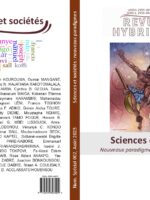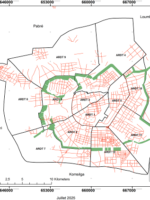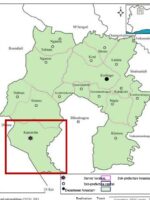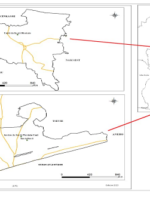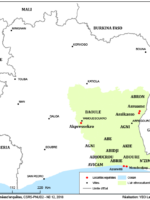The impact of TPACK skills on the professional identity of Senegalese teachers: a quantitative study
Université Numérique Cheikh Hamidou KANE (UNCHK)
Email : oumar.sall3@unchk.edu.sn
Orcid id: https://orcid.org/0009-0007-1605-4854
Université Iba Der THIAM de Thiès (UIDT)
Email : mouhamadoune.seck@univ-thies.sn
Université Numérique Cheikh Hamidou KANE (UNCHK)
Email : ousmane1.sall@unchk.edu.sn
Orcid id: https://orcid.org/0009-0009-5410-0334
Résumé : Le système éducatif sénégalais traverse actuellement une importante transformation numérique qui va redéfinir à la fois les pratiques pédagogiques et les exigences professionnelles à l’égard des enseignants. Cette étude analyse l’impact des compétences technopédagogiques (TPACK) sur la construction de l’identité professionnelle des enseignants du secondaire technique au Sénégal. Une approche quantitative transversale a mobilisé 155 enseignants via un questionnaire évaluant leur maîtrise des dimensions TPACK et les composantes de l’identité professionnelle (centralité, valence, solidarité, présentation de soi). Les données ont été traitées par analyse factorielle et régression linéaire. Les enseignants présentent une identité professionnelle forte (centralité : M=4,45 ; présentation de soi : M=4,46), mais une intégration modérée des technologies (TK : M=3,74 ; TPACK : M=3,76). L’analyse révèle que les compétences pédagogiques et disciplinaires (β=0,668) prédisent majoritairement cette identité, tandis que l’intégration technologique a un impact significatif mais limité (β=0,127). Les résultats soulignent la nécessité de formations continues articulant outils numériques, pédagogie et réalités locales, afin de renforcer l’appropriation des TIC sans altérer l’identité enseignante. Cette recherche appelle à des politiques éducatives équilibrées, valorisant à la fois l’expertise traditionnelle et l’innovation numérique.
Mots-clé : Modèle TPACK, Identité professionnelle, Transformation numérique, Développement Professionnelle
Abstract : The Senegalese education system is currently experiencing a substantial digital transformation that will profoundly impact pedagogical practices and the professional requirements placed on teachers. This study analyzes the impact of techno-pedagogical skills (TPACK) on the construction of the professional identity of technical secondary school teachers in Senegal. A cross-sectional quantitative approach was employed, and 155 teachers were surveyed using a questionnaire that assessed their mastery of the TPACK dimensions and the components of professional identity, including centrality, valence, solidarity, and self-presentation. The collected data underwent rigorous analysis using factor analysis and linear regression. The analysis revealed that the teachers exhibited a robust professional identity, as evidenced by their high scores on the centrality and self-presentation dimensions of the professional identity scale. However, the integration of technology in their pedagogical practices was found to be only moderate. The analysis revealed that pedagogical and disciplinary skills (β=0.668) predominantly predict this identity, while technological integration has a significant but limited impact (β=0.127). The findings underscore the necessity for in-service training that integrates digital tools, pedagogy, and local contexts to facilitate the adoption of ICT without compromising the teacher’s identity. This research underscores the necessity for balanced educational policies that value both traditional expertise and digital innovation.
Keywords: TPACK model, Professional identity, Digital transformation, Professional development.
Références bibliographiques
Beijaard, D., Verloop, N. & Vermunt, J. D. (2000). Teachers’ perceptions of professional identity : An exploratory study from a personal knowledge perspective. Teaching and Teacher Education, 16(7), 749‑764. https://doi.org/10.1016/S0742-051X(00)00023-8
Canrinus, E. T. (2011). Teachers’ sense of their professional identity. [Phd Thesis, University of Groningen]. Universiteit Groningen. http://hdl.handle.net/11370/ce864876-1b60-4e30-9799-f0c8e89afc31
Diagne, B. D. & Cheneval-Armand, H. (2023). Characterisation of the professional identity of teachers of vocational and technical training in Senegal : an exploratory study. Review of Science, Mathematics and ICT Education, 17(1), 23-44 https://doi.org/10.26220/rev.4166
Dieng, A. (2025). Analyse de l’intégration du numérique dans trois établissements de formation professionnelle au Sénégal. Sciences Appliquées et de l’Ingénieur, 6(2), 53-58 http://publication.lecames.org/index.php/ing/article/view/35176
Gaudet, J., Valois, R. & da Silveira, Y. (1996). Représentation du soi professionnel des enseignants. Revue des sciences de l’éducation, 22(1), 119‑144.
Gu, Q. & Day, C. (2007). Teachers resilience : A necessary condition for effectiveness. Teaching and Teacher Education, 23(8), 1302‑1316. https://doi.org/10.1016/j.tate.2006.06.006
Inan, F. A. & Lowther, D. L. (2010). Factors affecting technology integration in K-12 classrooms : A path model. Educational Technology Research and Development, 58(2), 137‑154. https://doi.org/10.1007/s11423-009-9132-y
Karsenti, T., Collin, S. & Harper-Merrett, T. (2011). Pedagogical integration of ICT: successes and challenges from 100+ African Schools, https://depot.erudit.org//id/003779dd
Koehler, M. & Mishra, P. (2009). What is Technological Pedagogical Content Knowledge (TPACK)? Contemporary Issues in Technology and Teacher Education, 9(1), 60-70. https://www.learntechlib.org/primary/p/29544/ (Consulté le 5/05/2025)
Koehler, M. J. & Mishra, P. (2016). Handbook of technological pedagogical content knowledge (tpack) for educators. Routledge.
Kremer, L. & Hofman, J. E. (1985). Teachers’ professional identity and burn-out. Research in Education, 34(1), 89-95. https://doi.org/10.1177/003452378503400106
Levi-Keren, M., Michael, R. & Efrati-Virtzer, M. (2022). The role of cooperating teachers and the training program in the development of professional identity among pre-service special education teachers. Educational Studies, 51(3), 253-274. https://doi.org/10.1080/03055698.2022.2133958
Mishra, P. & Koehler, M. J. (2006). Technological Pedagogical Content Knowledge : A Framework for Teacher Knowledge. Teachers College Record, 108(6), 1017-1054. https://www.learntechlib.org/p/99246/ (Consulté le 21/03/2024)
Mishra, P. & Koehler, M. J. (2008). Introducing technological pedagogical content knowledge. In annual meeting of the American Educational Research Association 1(1), 1-16. http://www.matt-koehler.com/publications/Mishra_Koehler_AERA_2008.pdf (Consulté le 14/03/2025)
Porras-Hernández, L. H. & Salinas-Amescua, B. (2013). Strengthening Tpack : A Broader Notion of Context and the Use of Teacher’s Narratives to Reveal Knowledge Construction. Journal of Educational Computing Research, 48(2), 223‑244. https://doi.org/10.2190/EC.48.2.f
Shulman, L. S. (1986). Those Who Understand : Knowledge Growth in Teaching. Educational Researcher, 15(2), 4-14. https://doi.org/10.3102/0013189X015002004
Shulman, L. S. (1987). Knowledge and Teaching : Foundations of the New Reform. Harvard Educational Review, 57(1), 1-23. https://doi.org/10.17763/haer.57.1.j463w79r56455411
Tardif, M. (2013). La condition enseignante au Québec du XIXe au XXIe siècle. Presses de l’Université Laval.
Voogt, J., Fisser, P., Pareja Roblin, N., Tondeur, J. & van Braak, J. (2013). Technological pedagogical content knowledge – a review of the literature. Journal of Computer Assisted Learning, 29(2), 109‑121. https://doi.org/10.1111/j.1365-2729.2012.00487.x
Xu, Z. & Ibrahim, N. M. (2023). Status Quo of the Professional Identity of Teachers : A Quantitative Study of College EFL Teachers in China. Theory and Practice in Language Studies, 13(12), 3352-3359. https://doi.org/10.17507/tpls.1312.34


